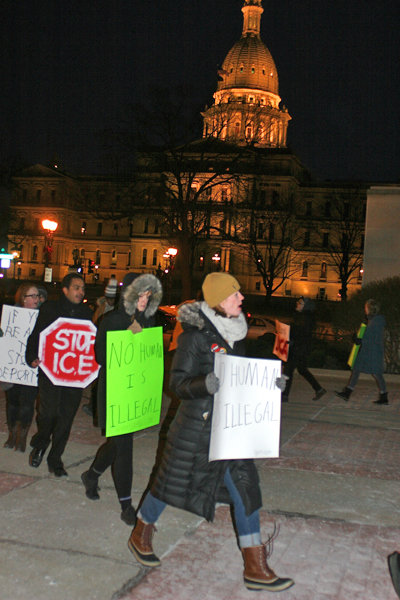But wavering and opposition at City Hall suggest that punitive measures enacted by Trump and proposed by state legislators are already having their intended chilling effect.

Councilwomen Kathie Dunbar and Carol Wood are drafting a sanctuary city resolution that will be taken up at the Council’s general meeting on Monday.
The resolution is likely to win the support of Councilwomen Tina Houghton and Jessica Yorko, but other Council members and Mayor Virg Bernero have questioned the need for it.
Dunbar said she’s gotten more email on this issue than she’s ever received as a Council member, “hundreds, with only three against and the rest in favor.”
Lansing School Board member Guillermo Lopez is one of a group of citizens who submitted a draft sanctuary city resolution to the Council last fall.
“I hope our leaders can come together and show a unified front on this, but I don’t know,” Lopez said.
An executive action signed by Trump Jan. 25 threatens withdrawal of federal funds from sanctuary cities.
About $6 million to $6.5 million is at stake in Lansing, including federal block grants for social services such as the Lansing Housing Commission, which serve the city’s most vulnerable citizens.
“The moral question is not complex,” Wood said, “but the potential impact is complicated and potentially harmful.”
Bernero is walking a tightrope between supporting sanctuary city policies and running afoul of potential federal and state penalties.
The mayor issued a statement Monday supporting Lansing’s “welcoming city” status, but he hasn’t said whether he'll veto any sanctuary city resolution passed by Council.
“I think we are a sanctuary enough,” Bernero told the Lansing State Journal last week.
Bernero pointed out that Lansing already limits police cooperation with the federal Iimmigration and Customs Enforcement division of the Department of Homeland Security.
“In my tenure as mayor, Lansing has not assisted federal authorities in conducting sweeps for undocumented immigrants,” Bernero wrote in an email to City Pulse.
Nor will they, Police Chief Michael Yankowski told City Pulse. Yankowski said Lansing police “will not be engaging in law enforcement activities based solely on someone’s immigration status.”
Wood and Dunbar said the city is already doing everything that sanctuary cities do, only without the label, and Council President Patricia Spitzley is reluctant to advertise the fact.
“Do I want Lansing to have a bulls-eye on it? No,” Spitzley said. “I don’t want to bring any sort of attention like that on the capital city. I’ve not seen any bluffing with [Trump’s] administration.”
However, any city that quacks like a duck is likely to find itself in Trump’s sights, whether it calls itself a duck.
Trump’s order gives the secretary of Department of Homeland Security discretion to designate a city a “sanctuary jurisdiction,” judging by its policies.
“The executive order is looking to punish the practice, not the designation,” Dunbar said. “So we may as well call it what it is.”
“Sanctuary city” is not a legal term, but neither is it an empty rhetorical flourish.
Susan Reed, a managing attorney at the Michigan Immigrant Rights Center, said “a sanctuary city is about sending a message to immigrant communities that local police aren't a deportation force, and they should seek police involvement in matters affecting public safety without fear,” Reed said.
Lopez said that in a time of maximum anxiety in the immigrant community, that message needs to be as clear as possible.
“A primary purpose of a sanctuary ordinance is that it gives people a respite from their worries about being outed, or deported,” Lopez said. “A lot of people don’t call in an emergency, because they’re undocumented and receiving any service from the city would uncover their status.”
In a letter to Bernero and the City Council posted on Facebook this week, former Councilman and Refugee Development Center director Vincent Delgado, now on a research stay for MSU in Costa Rica, urged the city to embrace sanctuary status.
“Fear turns to anger to threats to policy to presidential executive orders and newly introduced state house bills,” he wrote. “Responding to threats takes great courage…but it is something we have always done.”
On Jan. 26, Rep. Pamela Hornberger, R- Chesterfield Township, introduced House Bill 4105, the “Sanctuary Policy Prohibition Act.”
The bill threatens to cut state revenue sharing to cities with sanctuary policies. Lansing’s $123.5 million general fund budget for the 2017 fiscal year includes $14,275,900 in state revenue sharing, but Lansing Finance Director Angela Bennett said $9.1 million of that money “cannot be changed without a state constitutional amendment.”
Dunbar called the proposed state bill a “drastic overreach” that will be challenged in court and “tied up for years.”
Dunbar said she is “ready to fight” the bill after consulting with Kimberly Buddin, policy counsel of the ACLU’s Michigan chapter, and other legal experts.
Buddin said the proposed Michigan law, and others like it around the country, “invites” local police to operate like ICE, without procedural safeguards, and to ethnically profile suspects, “a clear-cut constitutional violation.”
But other Council members remain wary of Trump’s big stick and the lesser switches of the Legislature.
Councilman Adam Hussain said there are “many unknowns at this point” and he is in favor of “continuing the conversation with the law as a guide.”
Councilwoman Jody Washington dismissed Dunbar’s support as “grandstanding” and predicted “there will be no resolution to vote on” next week.
Councilwoman Judi Brown Clarke worried about the “unintended consequences” of a sanctuary city resolution. Brown Clarke said her decision would be guided by what the “law department says.”
“I am not trading one life for another,” Brown Clarke said, referring to the potential loss of services.
Wood said she is receiving many emails in support of sanctuary city status, but most are from non-residents. Mail from residents is running about 60 percent against, she said.
Todd Heywood contributed reporting to this story.
Support City Pulse - Donate Today!
Comments
No comments on this item Please log in to comment by clicking here